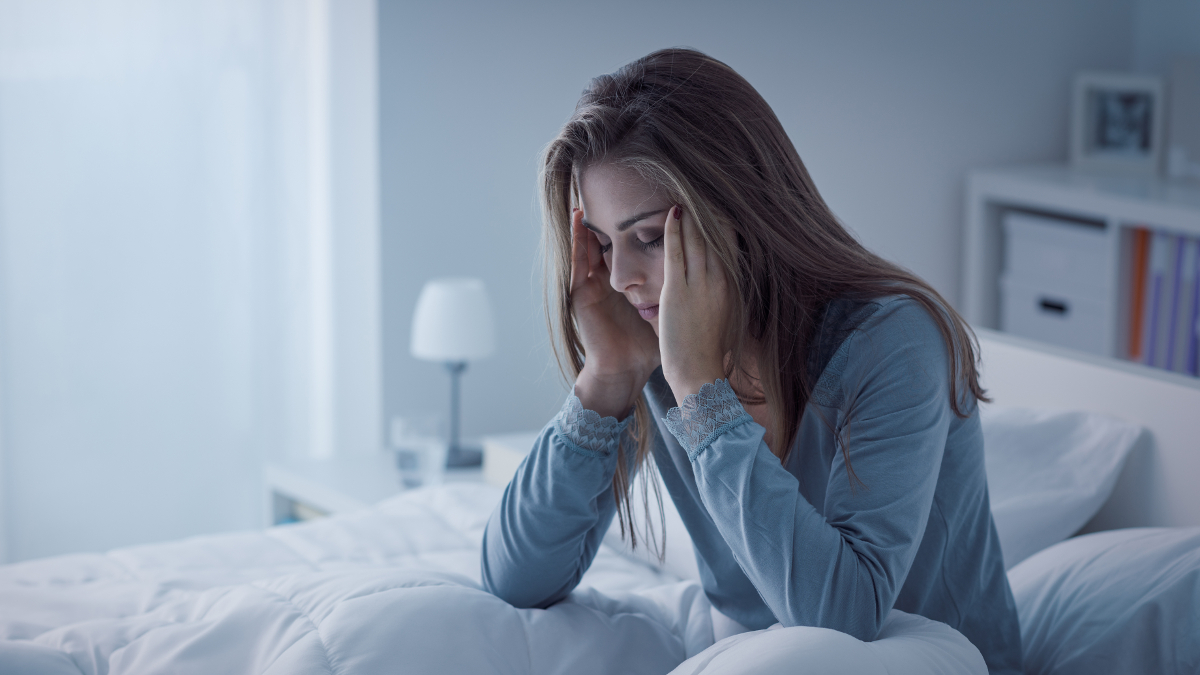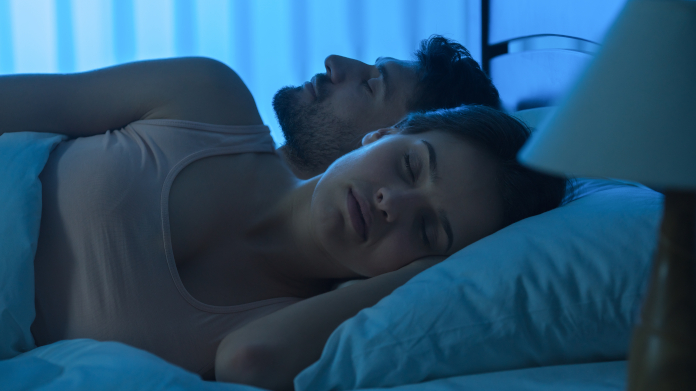Sleep: the 5 most effective plants for beating insomnia
Sleeping well is not always easy … but the good news is that certain plants can help restore the joys of a good night’s sleep. Read on to find out which 5 plants can help put an end to disrupted nights.

Sleep problems: a few reminders
There are different kinds of sleep problem: difficulty falling asleep, frequent waking in the night, total insomnia … Those who suffer with these chronic problems end up with an increasingly large sleep debt or deficit.
But why do we sleep so badly? Perhaps our modern lifestyles are to blame. According to a study conducted on a sample of 14,000 Europeans (1), we sleep less well when we use digital devices before going to bed. Similarly, sharing a bed with a partner can also disrupt the quality of our sleep (as a result of snoring, restlessness, etc.)
Specialists agree that an adult needs between 7 and 9 hours’ sleep a night to remain in good health. This is because sleep not only enables the body to rest but it also boosts the immune system. Good quality sleep is therefore an invaluable aid to resisting all kinds of infection, and in addition, it improves cognitive function.
If your sleep quality is less than ideal, rest assured there are certain plant extracts which offer natural solutions to promoting drowsiness and good quality sleep.
Hops and sleep
Hops (Humulus lupulus) grow in temperate regions such as Europe and North Africa. In phytotherapy, it is just the plant’s female flowers that are used as they have a soothing effect and promote good quality sleep(2).
Hop cultivation developed to meet the demands of bread and beer production. The plant’s sedative effects were discovered when it was found that those who harvested the flower clusters had a tendency to fall asleep easily at work.
The relaxing effects of California poppy
As its name suggests, the California poppy (Eschscholzia californica) comes from the south-west of the United States. It was used by native Americans to help get their children off to sleep.
Today, it is grown for the beneficial properties of its aerial parts: the seeds, flowers and stems. Not addictive, this plant is recommended for those suffering from anxiety, fitful sleep and insomnia. Itsrelaxing action is effective against nervous restlessness (3). It features in certain dietary supplements (such as the formulationNatural Sleep Formula, which also contains hop and rhodiola).
Valerian, highly effective against insomnia
Valerian (Valeriana officinalis) is primarily known for being an excellent catnip. It has been used since the time of Ancient Greece for its fragrant root which contains valerenic acid.
This substance is used to both fight insomnia as it appears to help synchronise sleep cycles, as well as to help support good mental health (4).
The soothing properties of hawthorn
Hawthorn (Crataegus laevigata), long-associated with a range of virtues, is today used in many drug formulations. In particular, it helps to support circulatory and nervous function.
Its relaxing effect helps those suffering from insomnia to get back to sleep more quickly when they wake in the night (5).
Passion flower for restorative sleep
Passion flower (Passiflora incarnata) was widely used in Mexico by the Aztecs for its sedative properties.
World-renowned, it is used nowadays to reduce psychomotor agitation, boost the body’s resistance to stress, induce a state of calm, and promote restorative sleep (6). Dietary supplements are a convenient way of benefiting from its positive effects (such as the formulation Stress Relief Formula, also rich in magnolia, polygala, magnesium...)
Choose a synergistic formulation that combines all 5 of these plants
If you suffer with sleep problems, it’s possible to take a synergistic formulation offering the combined benefits of all five of these plants.
You could opt for the unique supplement Advanced Sleep Formula, which along with these effective plant extracts, also contains vitamin B6 and lithium orotate. The various compounds in this product will help you rediscover the benefits of a good night’s sleep.
Bonus: and what about melatonin?
In addition to these plants, we can’t possibly fail to mention melatonin.
This natural hormone is produced by the body as night falls to send the signal that it’s time to sleep. Melatonin thus helps to reduce the time it takes to fall asleep. Frequent travellers may also find melatonin useful as it helps reduce subjective sensations of jetlag (7).
Melatonin can be found in supplements such as Melatonin and Melatonin Spray (a spray form that works more rapidly). This hormone is also included in the above-mentioned product Advanced Sleep Formula.
Alternatively, you could opt for the melatonin precursor L-tryptophan, which also promotes production of serotonin (the ‘happy hormone’).
References
- https://www.breizh-info.com/2017/10/04/78666/sommeil-etude-sondage-francais-europeens/
- Franco L, Sánchez C, Bravo R, Rodriguez A, Barriga C, Juánez JC. The sedative effects of hops (Humulus lupulus), a component of beer, on the activity/rest rhythm. Acta Physiol Hung. 2012 Jun;99(2):133-9. doi: 10.1556/APhysiol.99.2012.2.6. PMID: 22849837.
- Fedurco M, Gregorová J, Šebrlová K, et al. Modulatory Effects of Eschscholzia californica Alkaloids on Recombinant GABAA Receptors. Biochem Res Int. 2015;2015:617620. doi:10.1155/2015/617620
- Bruni O, Ferini-Strambi L, Giacomoni E, Pellegrino P. Herbal Remedies and Their Possible Effect on the GABAergic System and Sleep. Nutrients. 2021;13(2):530. Published 2021 Feb 6. doi:10.3390/nu13020530
- Can OD, Ozkay UD, Oztürk N, Oztürk Y. Effects of hawthorn seed and pulp extracts on the central nervous system. Pharm Biol. 2010 Aug;48(8):924-31. doi: 10.3109/13880200903305500. PMID: 20673180.
- Kim GH, Kim Y, Yoon S, Kim SJ, Yi SS. Sleep-inducing effect of Passiflora incarnata L. extract by single and repeated oral administration in rodent animals. Food Sci Nutr. 2019;8(1):557-566. Published 2019 Dec 19. doi:10.1002/fsn3.1341
- Zisapel N. New perspectives on the role of melatonin in human sleep, circadian rhythms and their regulation. Br J Pharmacol. 2018;175(16):3190-3199. doi:10.1111/bph.14116
Keywords
15 Hours
great products and prices
great products and prices
Marie
6 Days
Easy to navigate site
Easy to navigate site, had what I was searching for, good price. easy order-check out
James Tucker
12 Days
My skin is clearing up nicely!
Pretty good for my skin so far.
Christian
14 Days
The new packaging is excellent
The new packaging is excellent - finally! No more squashed boxes and torn envelopes.
GORAN
15 Days
Great Product
Great Product
Larry Garrett
19 Days
Quick shipping
Quick shipping; good price. No issues!
Mary McCarty
21 Days
Thr product is very good and is helping…
Thr product is very good and is helping me on my health. Then is always on time
LUGO Luz
23 Days
Buying was fine
Buying was fine. I had problems with the website not recognizing my login info, and had to call to get it fixed. Other than that, everything was good.
David S. Clark
24 Days
Your super maca and super ginseng are…phenomenal
Your super maca and super ginseng are phenomenal supplements that compliment each other when taking them together. Fantastic feeling of well-being and lots of mid day energy without the crash.
Keith Mason
26 Days
I have had amazing results with every…
I have had amazing results with every supplement I've purchased. I am extremely satisfied with this company
kirstin Torres
27 Days
Fine products
Fine products . They are on the leading edge of online supplements. The only issue -so far-is they sometime run out of subscription items.
Jason Argos
29 Days
The ordering process is very user…
The ordering process is very user friendly and the products always come in a timely manner.
CARTER Rhonda
30 Days
The price for Dr
The price for Dr. Pero's AC-11 is reasonable and in line with his views. (my former colleague). Keep it pure.
CAMPBELL Clayton
33 Days
Right on every time.
Right on every time.
Arthur Nicholas
36 Days
They are cheaper than everyone else and…
They are cheaper than everyone else and the shipping was fast. Great company.
Patricia Adams




